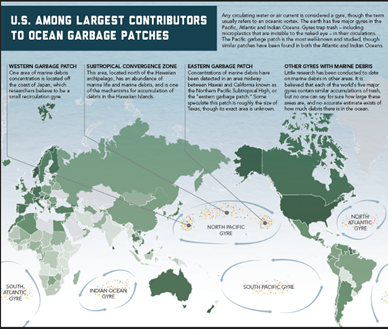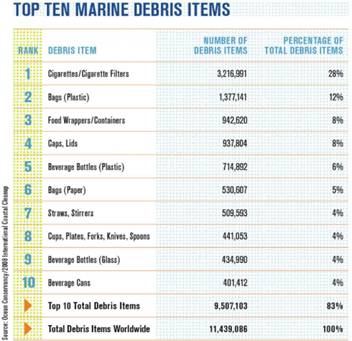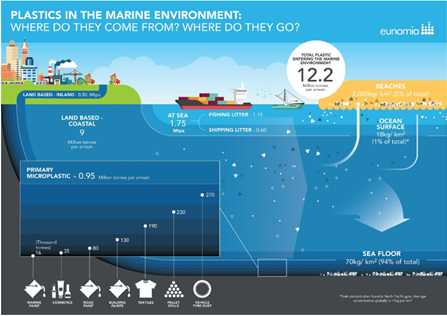Trash Free Water
White Paper:
United States Environmental Protection Agency
EXECUTIVE SUMMARY
This white paper contains information on the increasing global emergent concern of Marine Debris. The paper includes insights on various sources of Marine Debris, its major impacts on the ecological and economic effects. In this regard special services of USEPA has been considered along with various other agencies to elaborate the overwhelming concern to the public.
The purpose of this White Paper is to educate people about Marine Debris, its impacts individually and collectively. What measures can be taken to reduce and minimize its impacts for a healthier and prosperous future and how to save our planet earth.
Background
United States Environmental Protection Agency (USEPA) is an official federal government body that is in Washington DC. It was established in 1970 to consolidate environmental pollution, federal research, monitoring, standard-setting and enforcement activities to ensure environmental protection. The Marine Debris is one of the growing concerns globally and long-ago scientists, ecologists and environmental researchers have indicated an alarming situation by 2050 which will ultimately fill the ocean water with trillions of litters that major parts of the ocean could get isolated and become dead zones.
Key Findings
Along with USEPA, different environmental agencies have successfully established the awareness polices to cater and minimize this challenge. Some of them are:
- Educating people about Marine Debris and how to mitigate this growing problem.
- Forcing many manufacturing companies to use renewable energy alternatives to reduce plastic production
- Support developing countries to encourage to put bans on one-side plastic usage
- Plastic will be more than fish in the Ocean in 2050.
- It took almost 450 years for a single plastic water bottle to decompose.
- 500bn tons of plastic is produced annually, which will be doubled by 2050.
INTRODUCTION
The USEPA (United States Environmental Protection Agency) has always conducted research and analysis to address the important issues related to Marine Debris and its ecological, socio-economic and health impacts of trash and debris in the aquatic environment. Marine Debris is any man-made, solid material that enters the waterways either through littering or indirectly through rivers, streams and storm drains (Thank You Ocean). More than 90% of marine pollution consist of land-based activities and comprise mostly of plastics to pesticides (Jambeck et al.).
This white paper includes information on the significant global economic issue of Marine Pollution. The importance of marine debris and its related impacts on the global environment through various scientific sources. Generally, the purpose of this paper is to spread awareness of this growing concern and to highlight the potential barriers for EPA and other related agencies to implement measures feasible to address this issue.
The USEPA is headquartered at Washington, D.C (USEPA) and its strategic planning for year 2022 empathizes three archiving goals for marine debris and its mission of protecting human health and the environment resonates:
- Refocus the agency back to its core mission.
- Restore power to the states through cooperative federalism.
- Lead the agency through improved processes and adhere to the rule of law (USEPA).
Why Need A Trash Free Water?
The contemporary ecological and economic researchers have continuously espoused the increasing significance of risks associated with marine debris and its impacts on the environment. Today, marine litter or debris impose large threat to marine life. Thousands of mammals, seabirds and fish die through ingestion and get entangled with plastic debris. The production of plastic debris doubles each year, and what ends up in the ocean is nearly impossible to clean up, a researcher at US National Geographic agency, Laura Parker, highlights the emerging concern for the world at large (Atkin). Similarly, Annalisa, an Italian ecological writer, warns that if the production of plastic continues as of today, there will be more plastic in the ocean by 2050 than fish. The need for trash free water is now becoming an emerging issue, that if not catered will eventually push the marine life to completely extinguish and cause serious health concerns for people living next to shore lines and may disrupt the drinking water distribution across the globe.
Awareness of Marine Debris and Marine Wild Life
The most affected waters are the Baltic Sea and Mediterranean Sea. According to WWF (World Wide Fund for Nature) 2018 report titling “Out of the Plastic Trap: Saving the Mediterranean from Plastic Pollution” (Alessi et al.) depicts that the sea heritage of extraordinary environmental sites and cradle of civilization is now the highest polluted sea from plastic. It accounts for 90% of the total pollution, and countries like Turkey, Spain and Italy are among the many contributors. This often kill, injure and suffocate the marine wildlife. The Baltic Sea, apart from “plastic island” found near the North Pacific Ocean (Pichel et al.), is mainly polluted by House-hold related waste which accounts for 48% and rest are contributed by recreational and tourism. Populating the virtual database of articles, Melissa Cristina Márquez, a Latina marine biologist and conservationist, explains the urgency of marine debris to large scale environmental agencies such as EPA and NOAA etc., to take immediate measures at Baltic Sea to save the existing waterways for becoming dead sea zones.
Existing Multinationals for Global Environmental Protection
Unlike the EPA that strive to protect and spread the awareness of protecting the environment, there are number of global corporations working in similar industries such as WWF, United Nations’ Millennium Ecosystem Assessment Corporation etc. (Chen). which continuously with collaboration of governmental agencies thrive to support the cause of cleaning the planet. It has been argued most recently that the human resource spending and usage exceeds some planetary eco-boundaries. The environmental governance institutions lack the power and capacity to manage local and private consumption. Hence, the marine debris awareness programs are now widely initiated at all levels to ensure maximum alertness of this emergent issue (Oladokun, and Odesola).
TRASH & MARINE DEBRIS RELATED CONCERNS
Currently, the failure to steward the environment is the result of inadequate or ineffective governance response to marine debris. This can lead the world for resource conflicts in the future, public health disasters and eventually economic collapse (Horton et al.). In addition to these risks, following are few of the major concerns related to Marine Debris.
Potential Contamination Due to Microplastics

The USEPA has managed to revise the concerns needed to address one of the types of plastic debris i.e. microplastics and it also considered the research gaps in microplastic risk management which can heed up to fully understand the emerging problem. The workshop conducted by the organization back in 2017 (Murphy) allowed the participants to work on 4 major goals:
- Methods used, deficits and their needs
- Its main sources, transport and fate
- The ecological aspect
- Human health risks of microplastics exposure.
The findings suggested that small pieces of plastics are more harmful and could lead to an uncontrollable situation if left unaddressed. They cannot be catered with nets and could be major source of ingestion for marine wildlife, and ultimately affecting the food chain (Beaman et al.).
Associated Health Risk Issues
Similarly, the health risks associated with marine debris is the plastic contamination of chemicals with marine wildlife. Trash, litter and debris ever-increasing volume is entering the waterways through various sources presents a greatest challenge to habitat protection and water quality (Andrady). Currently, trash and debris are a persuasive problem for human health. The expert report in 2014 by USEPA showed insights upon these issues to be related to the fact that marine wildlife is being contaminated by microplastics and ultimately transits this unhealthily toxic through seafood and water distribution channels. This could lead to a series of new discoveries of diseases arising from eating contaminated seafood (Connors et al.).
Ghost Fishing, Ingestion, Vessel Damage and Navigation Hazards
Numerous impacts are continuously imposing the ecosystems to derail, and futuristic scope of current state portray this challenge extremely overwhelming. Ghost Fishing, and entanglement is one of the growing types of concerns, the derelict nets, ropes, balloon strings and rubber bank etc. can wrap around marine wildlife. Entanglement with these can lead to injury, suffocation, illness, starvation and even death (Bond et al.).
BARRIERS/CONCERNS THAT MAY IMPEDE PREVENTION AND POLICY IMPLEMENTATION
There are several barriers that exists which directly impact USEPA and all other environmental protection agencies for prevention and policy implementation. These concerns are related to awareness, geopolitical and economic issues as well as the high rate of carbon footprint of everyone.
Absence of International Awareness of Marine Debris
Nevertheless, the marine debris challenge is alarming, yet many Asian and under developed countries do not consider this issue as challenging or lack financial assistance to cater plastic debris. However, a report by USEPA in 2017 issues warnings to the federal government and UN environmental protection agency to impose heavy fines to Asian economies to control and monitor all type of litter entering the Indian Ocean (NCCF). Similarly, UNEP issued its global initiative report highlighting that there is wide spread of lack of scientific knowledge, and systematic upfront on the amounts, source and fates of marine litter in Global Eastern region which hampers development and implementation.
Geopolitical and Economic Barriers
The requisitions to stop production of plastic by the UN and USEPA and many other agencies have failed to implement it globally. The main reason, as intuitions from environmental agency UK, proclaimed that the geopolitical situations of many countries and its heavy dependence on plastic bags and containers for their economics make it nearly impossible to completely stop plastic production (McIlgorm et al.). The economies of these under developed countries is also one of the hurdles in catering to the overwhelming issue. For instance, plastic bags cost is 10 times lower than paper bags, and hence it makes very difficult for many small and large scale manufactures to adopt paper packaging as it can mean to lose large portion of their customers (Leonard).
High Rate of Carbon Footprint and Energy Consumption
Among the several reasons that impede implementation and policy making regarding marine debris is the high rate of carbon footprint of plastic and energy consumption. An environmentalist and scientific researcher Marie-Luise Blue, explains the carbon footprint of a plastic bottle to be equal to 3 ounces (Blue). She further investigates that transportation of raw materials of plastic impose a greater threat to environment. She said according to the recent UN report on plastic pollution it is estimated that plastic debris accounts for 33% of total carbon footprint and high use of energy. Moreover, the plastic bottle takes 4 full centuries to decay which almost make it impossible to control and manage debris entering landfills and waterways.
RECOMMENDATIONS
There are numerous efforts by USEPA and UN that provide recommendations to reduce and mitigate the marine debris. The implementation policies include:
- The USPEA introduced under the Clean Water Act, National Pollutant Discharge Elimination System (NPDES) that works with different regulating agencies to ensure mitigation at point sources that discharge sources of pollutants.
- EPA has also forwarded numerous bills to federal government to completely ban the use of polystyrene and plastic at the consumer level. They have also proposed to impose heavy taxes on single-use plastic and paper grocery bags.
- The Ocean science trust (OCT) in California, and Marine Debris Prevention Toolkit by EPA offers various tools such as print materials, educating through video and social media for prevention and mitigation.
- The USEPA is conducting analysis and surveys after every 5 years to ensure that with biodiversity and reengineering techniques the recycling process for plastics and other litter can be increased and educating public at large to help contribute their individual shares to cater to this emerging issue.
- Further, the Geopolitical countries and developing economies should be encouraged and provide donations to cater all litter and debris at national levels to reduce the overall impact (APEC).
- Miriam Goldstein, director at Centre for American Progress on a press release told that Ocean cleanup act has been revised to cater to the problem at large as its impacts on the ecosystems have been scale up to 60 devices in 2017. For this, she proposed to invest heavily in the Giant floating barriers that can use the ocean own energy to float and push the debris to side lanes, concentrate it and eventually pull it out (Summers).
However, the above recommendations are proposed from different regulating government and private agencies which mostly aim to address industries at large and ignore the individual footprint of marine pollutant. This white paper along with above suggests that as significant changes, upgrade and repairs are required by aging drinking water, wastewater and stormwater. Hence, these measures can prevent reduce the impact of marine debris individually, regardless of the geopolitical barriers and economies.
- Post signs at the water source to let general people know that any pollution can harm the quality of drinking water.
- The use of leftover paints, cans, cleaners and household medicines will eventually contaminate the soil and water if not recycled and dumped properly
- If someone happen to be near the shorelines, join voluntarily to clean up the beach. Look for programs offered by the federal government.
- Avoid products with excessive packaging and try to buy in bulk bins rather than individually packed items.
- People should adopt the habit of carrying reusable bags for shopping and all stores for reducing the usage of plastic or paper bags (Moran).
- Companies like Coca Cola, Unilever, and Starbucks are currently producing 500bn of single-use plastics bottles annually, if with this magnitude of creation of the problem persists, there is no way recycling or cleanup will be effective. Hence, STOP buying their products, and any products that use plastics extensively.
- Educate those who cannot afford schools and are deprived of the knowledge of litter and plastic debris.
EXAMPLES OF SUCESSFUL IMPLEMENTATION
There are numerous states and agencies that have successfully started and implemented polices to cater to this problem. Such experiences are as follows
National Oceanic and Atmospheric Marine Debris Program
This program aims to address and implement Municipal bag, cup and straw bans and have successfully implemented in Morocco, Iceland and Vancouver and in some US cities. The NOAA aims to educate people especially for youth behavior, banning the S.U.P, awareness through social media etc. These implementations are being so far successful in most US cities and people are actively participating in different marine prevention debris programs (NOAA).
World Wide Fund for Nature Global Campaign
WWF’s global campaigns from last 52 years have aimed to provide a cleaner and healthier environment. The Seize Your Power campaign forces manufacturing companies around the globe to use renewable and sustainable energy consumption and reduce the litter, chemicals and plastic they are disposing in the waterways. Another notable success for the WWF so far in marine debris is that it has provided to many fisheries sustainable ways and supported costal communities especially in developing countries to efficiently managing their marine resources (WWF).








